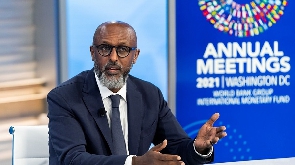 Abebe Selassie is the African Director at the IMF
Abebe Selassie is the African Director at the IMF
The International Monetary Fund has stated that Ghana's rising inflation is largely domestic-driven. According to African Director at the IMF, Abebe Selassie, Ghana is among countries whose inflation is caused mainly by internal factors. Ghana's inflation has risen to 37.2% as of September 2022, as it has been on an upward trajectory from the beginning of the year. But the government has noted that the inflation has been due to global factors including the COVID-19 pandemic and the Russia-Ukraine war. Speaking at a press conference at the recent IMF/World Bank Spring Meetings, Abebe Selassie, said “on inflation, I mean, again, there are always trade-offs when you’re doing policy calibration, and so in our regional economic outlook, we are very careful to flag that there are some countries where inflation has clearly been driven more by domestic factors than exogenous factors. I think Ghana would fall in that camp.” “But there are also quite a lot of other countries where the inflation we are seeing is more important, so the scope and the space and the ability of monetary policy to address that is limited. So again, it depends on country-specific circumstances, and on time,” he is quoted by myjoyonline.com. The IMF added that the adjustments of the monetary policy must be done swiftly because the adjustments affect how inflation is driven in the economy. He said, “exchange rates are moving, commodity prices are moving, so it’s an area where calibration must be very, looked at again and again and again, as the months proceed." "That’s why, Central Bank can say you have to be forward-looking, data-driven, so our advice is also, very much, subject to those considerations,” he added. According to the GSS, the factors that influenced inflation were, Housing, Water, Electricity, Gas and Other fuels (68.8%); Furnishings, Household Equipment, and Routine Household Maintenance (51.1%); Transport (48.6%); Personal Care, Social Protection and Miscellaneous Goods and Services (42.6%) as well as Food and Non-Alcoholic Beverages (37.8%). Watch the latest episode of BizTech below:
The International Monetary Fund has stated that Ghana's rising inflation is largely domestic-driven. According to African Director at the IMF, Abebe Selassie, Ghana is among countries whose inflation is caused mainly by internal factors. Ghana's inflation has risen to 37.2% as of September 2022, as it has been on an upward trajectory from the beginning of the year. But the government has noted that the inflation has been due to global factors including the COVID-19 pandemic and the Russia-Ukraine war. Speaking at a press conference at the recent IMF/World Bank Spring Meetings, Abebe Selassie, said “on inflation, I mean, again, there are always trade-offs when you’re doing policy calibration, and so in our regional economic outlook, we are very careful to flag that there are some countries where inflation has clearly been driven more by domestic factors than exogenous factors. I think Ghana would fall in that camp.” “But there are also quite a lot of other countries where the inflation we are seeing is more important, so the scope and the space and the ability of monetary policy to address that is limited. So again, it depends on country-specific circumstances, and on time,” he is quoted by myjoyonline.com. The IMF added that the adjustments of the monetary policy must be done swiftly because the adjustments affect how inflation is driven in the economy. He said, “exchange rates are moving, commodity prices are moving, so it’s an area where calibration must be very, looked at again and again and again, as the months proceed." "That’s why, Central Bank can say you have to be forward-looking, data-driven, so our advice is also, very much, subject to those considerations,” he added. According to the GSS, the factors that influenced inflation were, Housing, Water, Electricity, Gas and Other fuels (68.8%); Furnishings, Household Equipment, and Routine Household Maintenance (51.1%); Transport (48.6%); Personal Care, Social Protection and Miscellaneous Goods and Services (42.6%) as well as Food and Non-Alcoholic Beverages (37.8%). Watch the latest episode of BizTech below: